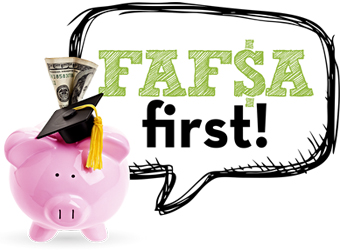 For families across the state of Florida, the belief persists that even though higher education is critical to success in life after high school, it is simply unaffordable. A study from the University of Florida revealed that, even though 88% of parents want their children to pursue a college education, less than a third believe they can afford it.
For families across the state of Florida, the belief persists that even though higher education is critical to success in life after high school, it is simply unaffordable. A study from the University of Florida revealed that, even though 88% of parents want their children to pursue a college education, less than a third believe they can afford it.
Many of these students could gain access to federal, state or institutional funding simply by completing a FAFSA (Free Application for Federal Student Aid). But students are often unsure of how to apply or are misinformed about what aid is available.
In Southwest Florida, the FutureMakers Coalition identified a few reasons families might not complete the FAFSA, including lack of awareness of aid options and stigma about being considered “financially needy.” Working as a network, FutureMakers developed effective strategies to help more students access money for college.
Building Awareness Around FAFSA Completion
With any FAFSA completion effort, the struggle is often getting the word out to students and parents that money is available for school. For Year Two of the FAFSA first! campaign, Gravina, Smith, Matte and Arnold Marketing and Public Relations Associate Partner and FutureMakers Coalition member Jennifer Hamilton had a unique idea to generate excitement and boost their campaign’s social media presence: create a mascot for their FAFSA campaign.
In early 2018, the campaign team introduced Hamlet, a pig in a graduation cap who encourages Southwest Florida students to get more money for their piggy banks by filing their FAFSA. Since Hamlet’s debut, FutureMakers has seen increased engagement on social media. For instance, one video on their Facebook page that detailed the scholarship program at the Southwest Florida Community Foundation received over 600 views.
By balancing social media activity, which includes relevant tips and information related to FAFSA completion, with fun, humorous Hamlet appearances, they are working to reach more students and their parents online about FAFSA.
“We hope that by catching their eye with a silly Hamlet video or interview, we can draw them in to learn more about FAFSA and how it can help them pursue postsecondary plans,” Jennifer said. “Besides college, a lot of students don’t realize that FAFSA could get them money for career school or a certificate program. We’re working to shed light on the little-known facts about FAFSA that can make a difference for what a senior decides to do after graduating high school.”
Addressing the Stigma
Social stigma creates reluctance for some students to file their FAFSA. Malaina Mote, a member of the FutureMakers Coalition and the scholarship coordinator at Southwest Florida Community Foundation, believes that some families feel they should be responsible with covering the cost of college themselves.
“Being financially ‘needy’ has a negative connotation,” she explained. So, when she works with students and parents, she emphasizes that Federal Student Aid looks at specific criteria to determine who qualifies for need-based aid. According to Malaina, “this means that a student’s parents might have a good career and be able to pay all their family’s bills, and still qualify for financial aid.” For these students, the key is emphasizing that there is no shame in taking advantage of available financial aid.
Another way the Southwest Florida Community Foundation team addressed the stigma was to make FAFSA completion a requirement for every local scholarship application. Students who are ineligible to complete the application are permitted to submit a document describing their unique situation in place of the FAFSA.
Encouraging students to both file the FAFSA and complete scholarship applications is a win-win situation. For instance, some students may be more willing to apply for a merit-based scholarship than for need-based aid, but be pleasantly surprised to learn that they qualify for grants or subsidized loans.
In other cases, students who know they qualify for federal aid can get additional funding to cover miscellaneous school expenses. “When I went to school,” Malaina explained, “I thought financial aid would be enough. But expenses like rent and books were not covered by financial aid. I wish I would have taken that into account.” By applying for local scholarships, students can get money to address costs that financial aid may not cover.
Need more FAFSA Resources?
To address some common FAFSA questions, FutureMakers created the FAFSA first! portal on their website.
Through the portal, parents, students, and college access professionals can access a variety of worksheets that help walk families through the application process, define financial aid terms, and address common mistakes or issues with FAFSA completion.
In addition to the great resources from FutureMakers, FCAN also provides the following FAFSA resources:
- 2018 Florida FAFSA Challenge Toolkit
- 2018 Florida FAFSA Challenge Data Dashboard
- Top 4 FAFSA Mistakes Students Make
- Webinar: Busting the Affordability Barrier: What You Need to Know About This Year’s Florida FAFSA Challenge
These resources are free to access, download, copy, and distribute for your next financial aid event!
